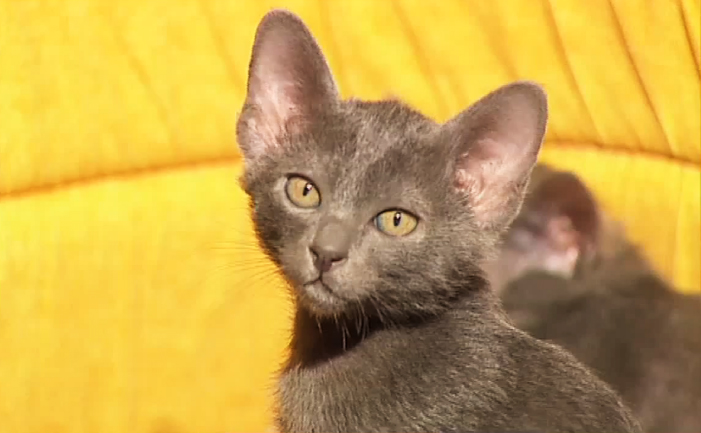
Breed: Korats
Temperament: self confident, friendly
Maintenance: low
Lifespan: 10-15 years
Cost: $600
Recommended for: cat lovers
History
The Korat breed comes from Thailand where it is also known as SiSawat. In Thailand the Korat cat is considered very good luck and for many years could only be given as a gift to someone who was deemed worthy. In Thailand cats and dogs are rarely kept as pets. Instead, they roam the streets scavenging for food. Purebred cats and dogs are very rare so importation of Korats from Thailand is extremely difficult. Korats were first brought to Australia in 1969 and the breed remains rare around the world.
Korat Fanciers Association
Korat breeders and some owners around the world are part of a global organisation called the Korat Fanciers Association. Members of this association say they work together to ensure the future of the breed. Before undertaking breeding of Korats, members are asked to sign an informal pledge to work to together in the preservation of the breed. Those who buy a Korat, be it a pet or otherwise, are also asked to sign a pledge outlining the care and responsibility to the breed. The association has a website at www.koratcat.org
Appearance
Korats are similar in appearance to a Russian Blue cat, but can be easily differentiated by their peridot green eyes and smaller size. Korats are medium-sized with a semi cobby body and a silver blue single coat. They have high-set ears on a heart-shaped face and the green eyes should be prominent. Although Korats are born silver, young Korats lack both the silver coat tipping and the brilliant eye colour of the adults, both of which may take two years or more to reach their full intensity. Females can be smaller and daintier than the males.
Temperament
Like their Oriental cousins the Siamese, Korats are full of personality and strong willed. Some describe them as pushy or bossy and often demanding. However, Korats do enjoy time with people and other pets and will be loving, playful, adaptive and self confident. Their affinity for spending time with an owner can even extend to the point of disruption. They are assertive and like to establish dominance over other pets and people in the house. It is also reported that they can be trained to perform simple tasks such as fetching. Korats are known for their vocal grumbling which some may interpret as bad temper, however owners are adamant this is not a display of aggression. This breed has also been renowned for its ability to hunt very successfully.
Maintenance and care
As a short haired cat, grooming is minimal and they require only occasional brushing to remove any loose hair. Korats are best confined indoors as much as possible. Due to their hunting skills owners and breeders recommend that this breed should be kept in an enclosed environment (for example a cat enclosure or a netted cat run) if they are allowed outdoors. Their thinner coat also means they may feel the cold a little. They may require some toys to keep them happy and occupied indoors and should also have access to grass (such as cat grass) if kept totally confined.
Health and lifespan
Korats are robust animals that are not prone to any particular illness and should live between 10-15 years or longer. The Korat suffers from a hereditary conditions know as Gangliosidosis (GM1 and GM2). These neuromuscular degenerative disorders are extremely rare in Australian cats. However Korat breeders involved in the Korat Fanciers Association are still obliged to have all kittens tested for the disease. Any animal affected by the disease is put down and those carrying the gene for the disorder are desexed by the breeders, but live happy lives as pets. Tail kinks are also prevalent in the breed, but this is considered good luck by the Thai people. This is a random recessive gene and virtually impossible to breed out.
Cost
A microchipped and vaccinated kitten should cost around $600. Every Korat pedigree has ancestry which can be traced back to Thailand and this pedigree will be outlined in the owner’s pledge. This pledge should also display the results of GM1 and GM2 testing.
Recommended for
Korats are not suitable for those owners who cannot spend quality time with their cat, but they are ideal for a mature family or an owner who spends time at home. A Korat’s desire to be close to others makes it an excellent companion for dogs and other cats. Kittens tend to spend a lot of time close by their owner and weave themselves around a person’s legs. This may make young cats unsuitable for those people with mobility problems.
More information
We filmed our story with Eva Krynda and Jose Escoiza of Sydney. For breeders in your state contact the Petcare Information and Advisory Service on 1800 631784 (free call within Australia).
NSW
Eva Krynda and Jose Escoiza
Phone: (02) 9550 9313
Email: [email protected]
Elaine Vincent
Phone: (02) 6677 7586
Email: [email protected]


